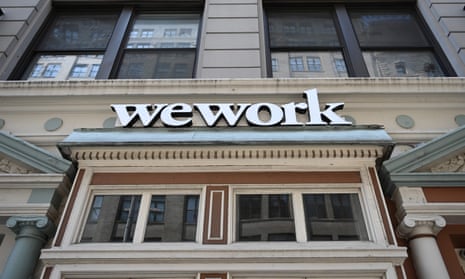A US firm run by two billionaire entrepreneurs is being paid €62m (£55.7m) in “financial inducements” as part of the Brexit-enforced relocation of the European Medicines Agency from London to Amsterdam.
WeWork, a $47bn (£37.7bn) property company founded by Adam Neumann and Miguel McKelvey, secured the cash from British and European taxpayers as part of a deal in which it will sublet the agency’s former headquarters, EU documents reveal.
All UK-based EU agencies have had to be relocated to other member states as a result of the UK’s decision to leave the bloc. The Netherlands won the right to host the EMA while Paris secured the European Banking Authority. But before its move to the Netherlands, the EMA failed in its bid to break its 25-year lease with its landlord, the Canary Wharf Group.
The EU agency had been facing £500m in costs, including an annual rent of €16m, on 26,000 sq metres (280,000 sq ft) of office space at 30 Churchill Place in Canary Wharf in London that it was unable to use.
The subletting deal with WeWork recoups an undisclosed amount of those costs but EU budget documents record that at least €62m has been paid to the US firm in an attempt to make the deal attractive. The sum covers the costs for 2019-20.
The EMA’s efforts to sublet the property had faced rising competition in London’s commercial subletting market as a result of businesses reducing their footprint in the capital in the light of the Brexit vote.
But the attraction of the Canary Wharf location was made clear by the company when it announced the lease agreement, describing it as a “desirable location for our member businesses who are rapidly scaling as well as the large enterprise companies who now represent 40% of our global membership”.
A spokesman for the Department for Exiting the European Union declined to comment on the costs to the Treasury from the relocation of the London-based agencies.
The EU’s budget documents for 2020 suggest that the payment to WeWork will add €6.5m to the forecasted outgoings to be met by the 28 member states.
Nine years after co-founding WeWork, Neumann, 40, its chief executive, and 45-year-old McKelvey, as chief culture officer, are reportedly worth $7bn between them. The company leases large office spaces, divides them up and rents them out out in smaller portions to businesses offering perks such as free coffee and beer.
Neumann once said the objective of his company was to “to elevate the world’s consciousness”.
WeWork, which operates in 27 countries and is preparing for a stock market flotation this year, is second only to the British government as an occupier of London offices, with more than 275,000 sq metres of space in the capital.
The EMA is currently in a temporary building in Amsterdam until completion of the construction of its new premises at the end of the year.
The agency’s latest management board meeting heard that that the EMA expected at least one in four of its staff to stop working for it by the time of the final move as a result of the relocation. Of the 776 members of staff, 312 are “teleworking” from London due to “personal circumstances”.
A spokesman for the EMA said of the payments: “This is standard practice in the London commercial property market and these inducements are typically used by the tenant to fit out the building to their specifications. EMA received similar financial inducements when we entered into the original lease. The financial inducements are being funded from the EU budget.”
